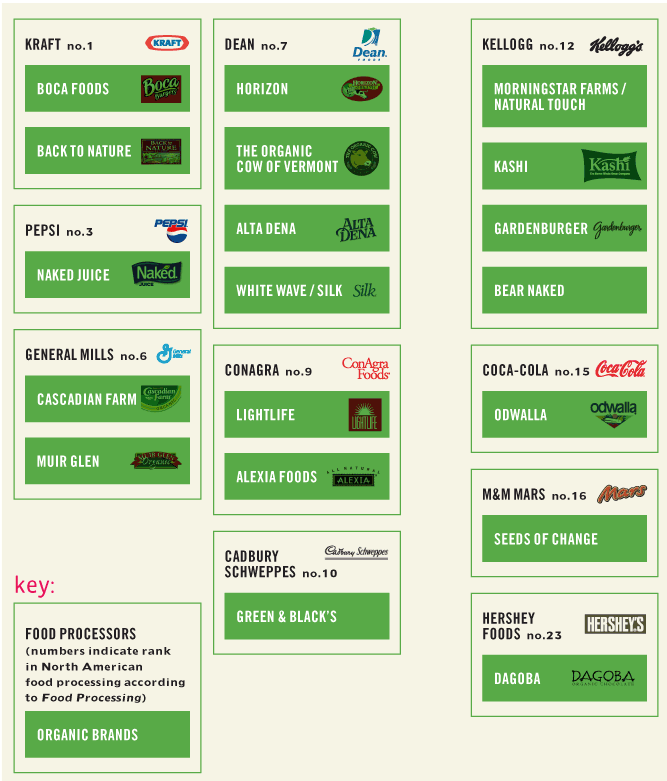I never would have imagined that my favorite smoothie drink and Coca-Cola had anything in common. Until I found out that Coca-Cola owns Odwalla. Odwalla, which promotes itself as "the juice company with a conscience", was started in 1980 by three jazz musician friends who started making juice out of a box of oranges in California. Their plan was to make enough profit to help fund music programs in local schools. The company flourished from its humble beginnings, but was purchased by Coco-Cola in 2001 for a cold $181 million.
The more I searched, the more I found similar stories of organic brands owned by large corporations:
Morningstar and Kashi ( Kellogg)
Horizon (Dean Foods)
Boca Foods ( Kraft)
Earth’s Best (Heinz)
Cascadian Farms (General Mills)
Naked Juice (Pepsi)
Coca-Cola, Pepsi and other parent companies had tried hard to capture the organic market for years, without much success. Their solution has been simple: If you can't beat them, buy them! The controversy this produces in the 'all natural' world is huge.
On the one hand are a group of cynics who argue that "natural doesn't mean much" these days. The practice of organic farming is highly incompatible with the factory farming methods needed for mass-production. Furthermore, many people believe that the ownership of organic brands by corporate giants makes these organic companies guilty by association. There's no saying how much bad influence spills over into the management of these smaller organic brands. Unless you grew it and baked it yourself, it's very hard to know how organic and sustainable your food is, and by extension, the companies that produced it.
On the other hand, as major conglomerates are financing and working to keep these brands successful, this has allowed healthy-er versions of foods and drinks to appear on supermarket shelves all across America. Indirectly, Coco-Cola, Kellogg, Pepsi and the others are ensuring a large supply of organic foods, which increases competition and drives down the prices. If we increase the public's awareness of natural foods by having organic brands produced on a mass-scale, people hopefully will soon push for small, local and sustainable farmers and companies. We may be loosing the battle by buying organic food owned by large companies, but when it comes to increasing the popularity of organic and healthy food alternatives, we are winning the war.
So the final judging moment is here and I straddle the fence. Both arguments are valid - there is a need for more readily available organic products on a mass-scale, and yet the means of achieving this often involves sharing a bed with these larger corporate giants. The solution seems clear: until the public begins to vote en-mass with their dollar for the small, sustainable, local food companies, this pattern of ownership by large corporations will likely continue.
Check out this amazing chart produced by Phil Howard and write a comment below to cast your vote on whether ownership by a corporate giant is a big no-no for an organic brand.
OVERALL RATING (of large corporations buying your favorite organic brand):










I don't think big corporations should own organic products
ReplyDeleteThis comment has been removed by the author.
ReplyDeletebig want to control.
ReplyDeletesmall sometime become greedy so instead of sharing with other for better world, they sell to big.
problem is big are only concerned with money & power also abuse the nature.
one can't become good by having /doing some good, if it still continue on other hand with exploitataton, unethical, etc.
metta to all
Thanks for the post Danai. I love your quote "I don't think we should make them our enemy, if the world demands more organic food and starts realizing the bad effects of coke for example, coca cola will change with us." I think the consumer has power! We can let companies know what we want by buying more organic.
ReplyDeleteEarthling, That's a really great point, too! Many of those smaller companies are selling in order to turn a profit. Do you think they are selling out?
yes no human is born bad & we should have compassion for others to change not hate.
ReplyDeletebut i feel big & csr individuals (ceo) / companies should not wait for consumer demand, but they should bring the best or awareness to public.
full inforamation is available on web or inner consciousness.
also yes some individuals or sme drop from journey by submitting to short term goals or losing trust in universe.
regards